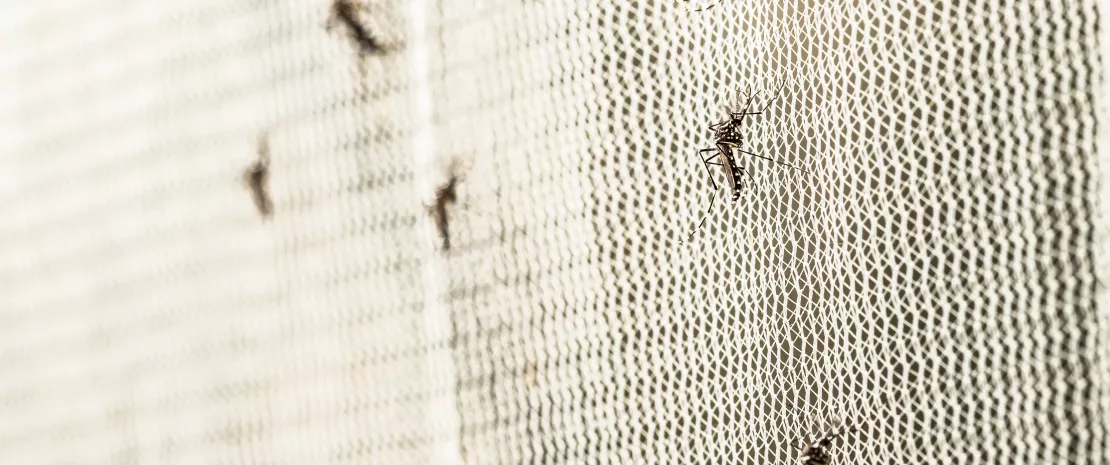Dengue and Zika: protecting mosquitoes to protect humans
Inoculating mosquitoes by introducing the Rosenbergiella_YN46 bacterium into their digestive system: a realistic and sustainable biological control strategy for reducing the transmission and prevalence of flaviviruses in the wild?
Lay public section
Find here your dedicated section
Sources
This article is based on scientific information

About this article
Mosquito-borne flaviviruses such as Zika, Dengue, West Nile virus, and yellow fever are potentially fatal to humans. The cause for concern is greater still given that climate change and phenomena such as El Niño favor such
(sidenote:
Vector-borne disease
A disease where a pathogen is transmitted to a host (human or animal) by the bite of a vector, such as mosquitoes, flies, ticks, or fleas.
Vector-borne diseases account for around 17% of all infectious diseases worldwide, with the WHO estimating that 80% of the world’s population lives at risk from at least one vector-borne disease.
Explore
https://www.pasteur.fr/fr/innovation/toute-actualite/actualites-innovation/comb…
)
, while mosquito control and population biological control campaigns have had limited impact to date.
What about adopting an entirely different strategy? Modifying the mosquito’s gut microbiota may protect it from infection and hence prevent it from transmitting the virus to mammals, including humans.
A tenfold increase in cases worldwide
Between 2000 and 2019, the World Health Organization (WHO) 1 reported a tenfold increase in the number of dengue fever cases worldwide, from 500,000 to 5.2 million.
After a slight decline during the COVID-19 pandemic, an upsurge in dengue fever cases was observed worldwide in 2023.
Bacterium that protects both mosquito and human
In this study, Chinese researchers 2 isolated 55 bacteria living in the digestive system of female Aedes albopictus mosquitoes, the main vector of Dengue fever, from insects captured in southern Yunnan. These bacteria included Rosenbergiella_YN46 (so named because it was identified in Yunnan), which, inoculated at a dose of 1.6 × 103 CFU (colony forming units), provided A. albopictus with persistent protection against
(sidenote:
Flavivirus
is a genus of viruses which consists of >70 members including several that are considered significant human pathogens. Transmitted to humans through the bite of infected mosquitoes, Flaviviruses display a broad spectrum of diseases that can be roughly categorised into two phenotypes:
- systemic disease involving haemorrhage (Dengue and yellow Fever virus)
- and neurological complications (West Nile and Zika viruses)
Explore
https://pubmed.ncbi.nlm.nih.gov/34696709/
)
.
How does this gut bacterium found in flower nectar enable A. albopictus and Aedes aegypti mosquitoes to resist infection by Dengue and Zika? By secreting a glucose dehydrogenase that converts glucose into gluconic acid, rapidly acidifying the mosquito’s intestinal lumen (pH < 6.5 after a blood meal). This acidic environment irreversibly modifies the protein envelope of flavivirus virions, preventing them from entering the mosquito’s gut epithelial cells.
390 million With up to 390 million people infected each year, dengue fever is the most common mosquito-borne flavivirus worldwide. ²
223,000 There were 223,000 confirmed cases of Zika infection in the Pacific Islands and the Americas between 2015 and 2017. ²
Effective strategy on a large scale?
But the researchers’ work did not stop there. Noting that Dengue prevalence varied between prefectures of Yunnan province, they wanted to see whether this phenomenon went hand in hand with an uneven presence of the bacterium. Indeed it did. Rosenbergiella_YN46 was more prevalent in the digestive system of mosquitoes from Wenshan (91.7%) and Pu’er (52.9%) prefectures, where only a few isolated cases of Dengue have been reported, while the bacterium was rare in mosquitoes from Xishuangbanna (6.7%) and Lincang (0%) prefectures, where Dengue is endemic.
Complementary experiments under semi-field conditions provide hope of a possible (sidenote: biological control Biological control is an environmentally sound and effective means of reducing or mitigating pests and pest effects through the use of natural enemies. Explore https://www.sciencedirect.com/journal/biological-control ) : sugar water laced with Rosenbergiella_YN46 suffices to contaminate the mosquito, with the bacterium then efficiently transmitted (sidenote: Transstadial transmission The vector (here, the mosquito) retains an agent (in this case, the flavivirus) in its body as it passes from one stage of development to another (here, from aquatic larva to winged adult). Explore Źródło ) , and from generation to generation (in mosquitoes, the gut microbiota is transmitted by the female mosquito to its offspring through larval and adult feeding).
Furthermore, introducing Rosenbergiella_YN46 into the aquatic habitat of larvae, or importing adults already carrying the bacterium, may reduce Dengue transmission in areas where the disease is endemic.


